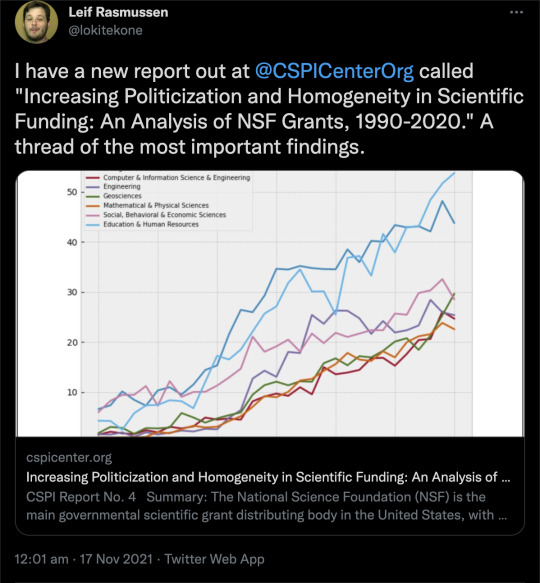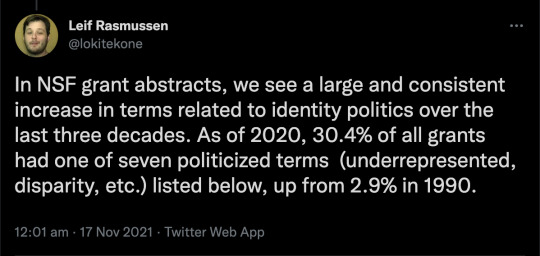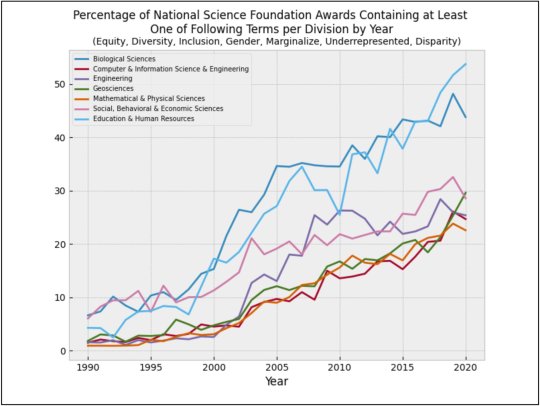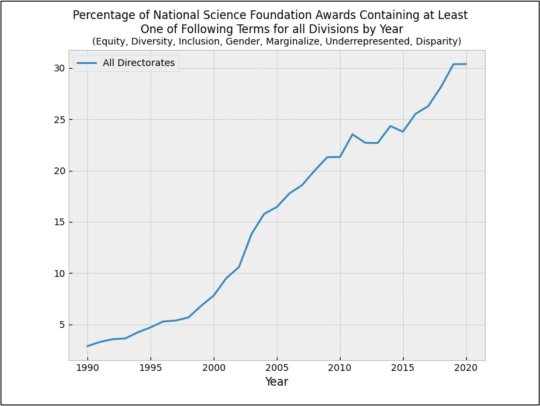#ideological corruption
Text


Richard Feynman introduced a concept he called “cargo cult science” during a commencement speech at Caltech in 1974.1 In the Second World War, Allied and Japanese airbases sprung up on islands in the South Pacific that were home to pre-industrial cultures that previously had little contact with the modern world. The soldiers on many of these bases would trade manufactured clothing, medicine, canned food, and other goods with the natives, most of which arrived by airdrop. After the war ended and the soldiers left, the native populations on some of the islands began to create replicas of things like airstrips, airplanes, and flight control towers. They even made mock radios and headphones out of coconuts and straw. The natives believed that by recreating the conditions under which the airplanes came and dropped goods, they could get the airdrops to resume.
There were entire areas of academic study that Feynman called “cargo cult science” – mostly in the fields of social science and education. These areas of inquiry see the success that the scientific method delivers in disciplines like physics, chemistry, and medicine, and produce superficial replicas of scientific practices. They miss something essential, however, and as Feynman says, “the planes never land.” So, what is this missing element in “cargo cult science?” It is “a kind of scientific integrity, a principle of scientific thought that corresponds to a kind of utter honesty.” Science requires a willingness to relentlessly assail one’s assumptions and a capacity to bend over backwards to try and disprove ideas even if one passionately wants to believe they are true. I would love to be able to revisit this critique of Feynman’s and have a good laugh at how strange and backwards academic institutions and scientific agencies must have been in the 1970s, but unfortunately, this critique feels as salient today as it must have when Feynman first expressed it almost 60 years ago.
Ideally, the “cargo cult sciences” should start to recede as their practitioners start to notice that “the planes aren’t landing.” What if, however, we have in place institutions that have degraded to a point where they subsidize and reward practices that are not actual science, but a kind of science-like interpretive dance? Patrick Collison and Michael Nielsen find that there has been a precipitous increase in the number of science publications, PhD students graduating in STEM fields, and government spending on National Institute of Health (NIH) and National Science Foundation (NSF) grants since the 1960s.2 Their same work, however, shows that when scientists were surveyed about the importance of Nobel Prize winning discoveries between the 1920s and 1980s, results indicated anywhere from a decline to a general stagnation in the impact of science over that time period – nothing anywhere near the output we might expect given the tremendous amount of time and energy now invested. One theory posited by Collison, as well as economist Tyler Cowen and others, is that science might just be getting harder; we have gotten to all the low-hanging fruit and now are in the territory of diminishing returns.
Science may be getting harder, but it seems unlikely that this is the sole, or perhaps even largest, cause of decreasing productivity. In addition to the previously mentioned increase in funding to scientific research, the costs of many of the important inputs to research – such as computing power, gene sequencing, and various types of lab equipment – have been declining exponentially. With a rise in funding and a decline in the costs of many inputs, we might expect to be able to generate increased scientific output despite potentially increasing difficulty.







Although a fuller explanation for technological and scientific stagnation is beyond the scope of this work, here I analyze the abstracts of successful NSF applications and find two reasons to believe that something has gone wrong with the culture of science, particularly in the last few decades. The first of these is increasing politicization. If paying lip service to fashionable political ideas becomes an important criterion for successful grant applications, this will certainly detract from the importance of other more vital criteria – namely those related to the quality and importance of the proposed research. When the process of deciding what research projects get funded comes to be based on a political litmus test, the scientific endeavor suffers. Additionally, the more that scientific institutions come to be viewed as conduits for promulgating ideology, the less capable they will be of swaying public opinion on important issues. We may be starting to see the harmful effects of this process in the current epistemic crisis regarding public health. The growing view of science as a vehicle for activism detracts from its more vital role of being a dispassionate referee that adjudicates the validity of empirical claims.
The second major result in this work is the constriction of the space of ideas within NSF award abstracts. The number of NSF awards given and the total amount of taxpayer money spent by the NSF have increased consistently since 1990, and yet this work provides evidence suggesting that the breadth of ideas within NSF award abstracts has been contracting. In different contexts, bureaucracies can become positive feedback chambers reinforcing and amplifying favored ideas while excluding others. Recent work by Johan Chu and James Evans supports this view by showing that the larger a scientific field becomes, the more it tends to stagnate, with more reliance on established works in citation patterns and fewer fundamental breakthroughs.3 The NSF is ostensibly an organization meant to stimulate scientific progress for the benefit of the nation, but the way in which it has become entangled with academia and established institutions may make it seem more like a professional guild representing the interests of its members. Such factors could explain the stagnation we see in the ability of the NSF to identify and support novelty.

==
Science is already under threat from religious faith as the superstitious insist variously that: their feelings-based beliefs, such as "intelligent design" occupy equal footing with actual science; evolution is a fiction and science is a tool of the "devil" to deny (their) god; and "science" (e.g. the pseudoscience called "creation science") has already verified the existence of (their) god.
We must protect it just as fiercely from political capture as the ideologically compromised insist variously that: "other ways of knowing" and "lived experience" are just as valid as actual science; sex, gender, math and even reality itself are merely "social constructs (and thus evolution is a fiction) and science is a tool of heteronormative white male supremacy or someshit; and their replacement "studies" pseudosciences have already confirmed their presupposed beliefs.
These are identical tactics. The problem is the latter are working much more successfully, and even being actively pursued to ideologically compromised institutions. People know to keep the former outside the gates, but are politically coerced into welcoming the latter.
There are already those who insist that science is "oppressive" because scientists have biases. Or in other words, they're telling us both that they don't understand how it works, and what they plan to do once they capture it. We already have nonsense "cargo cult" domains like "black math," "feminist glaciology" and "queer agriculture."
Science is the best of everything we've learned over the centuries about how to determine what's true. We shed the notion that we should accept a divine "truth" as prescribed by the ideologically motivated. We must also refuse the notion that we should accept a social or political "truth" as prescribed by the ideologically motivated.
As Lysenkoism taught us, corruption of science in the name of a political narrative has truly catastrophic consequences.
#Eric's Electrons#diversity equity and inclusion#diversity#equity#inclusion#intersectionality#intersectional religion#wokeness as religion#woke activism#cult of woke#wokeism#woke#corruption of science#science#ideology vs science#science vs ideology#ideology#corruption of knowledge#academic corruption#ideological corruption#gender activism#religion is a mental illness
138 notes
·
View notes
Link
A Priori Science In the Service of Power
by THOMAS HARRINGTON, FEBRUARY 24, 2022
“From 1564 to 1966 the Vatican regularly published and updated its famous Index Librorum Prohibitorum; that is, a list of books that were deemed to be off-limits to any right-thinking Catholic. The church’s reasoning on this was simple. And it went something like this.
Given the inherent fallibility of human beings, it was important that the clerisy guard its flock against contact with “misinformation” derived from “unreliable sources” that might divert their hearts and minds from what should always be their prime goal: gaining eternal salvation through the intercession of God’s institutional representation here on earth: the Church of Rome.
The creation and maintenance of the censorious Index was animated by what philosophers call a priori thinking; that is, a process of intellectual inquiry characterized by reasoning absent evidence from first principles. It works for mathematics, geometry, and other disciplines rooted in logical deduction. Applied to natural sciences, humanities, anthropology, politics, and history, it speaks to a desperate desire to justify the status of previously determined “truths” that fortify a particular and often highly self-interested view of reality.
As is so often the case, the timing of the decision to create this official list of impure and dangerous readings was no accident.
For nearly a thousand years prior to the inception of the Index, the lettered functionaries of the papacy had exercised a near total monopoly over how its vast and largely illiterate flock could interpret and visualize the designs of the Almighty.
However, all that began to change when, in the middle of the 15th century, Johannes Gutenbergperfected the technology of movable type. From this moment onward books—and more specifically the Bible—which up until that time could only be reproduced by hand and was thus available to a very limited slice of the population, suddenly became a more or less widely available consumer item. Over the next half-century the numbers of those able to read, and to thus develop their own shadings of God’s intentions, grew exponentially.
It was in the midst of this new “do-it-yourself” intellectual ferment that Martin Luther generated his Ninety-five Theses,” which would forever change the relationship between the commoner and state power in Western Europe.
To say that in issuing his critique Luther was taking on Rome would certainly be correct. But it would also be woefully incomplete, for Rome was in many fundamental ways a political appendage—and at the same time an essential symbolic guarantor—of the era’s unquestioned political, social and economic superpower: a Spanish-led Habsburg Empire.
In other words, to question the power of Rome was not a mere theological gambit, but also a deeply political one that struck at the very roots of a vast network of interlocking interests stretching from South, Central and North America, on to Spain as well as much of today’s Belgium, Holland, Italy and Austria.
Aware that the uncontrolled spread of Luther’s critique would seriously damage the cohesion of this enormous bundle of interests, the Church, working hand-in-glove with its Spanish Habsburg patrons, inaugurated the Council of Trent in 1545.
The goal of this 18-year long series of high-level meetings was quite clear: to coordinate a vast propaganda effort designed to centralize governance, codify and enforce the rituals, restrict the circulation in Europe of the emergent intellectual currents of Protestant thought (with their relatively strong emphasis on individual conscience and textual reasoning), and to establish new, more sensually appealing iterations of what it meant to live in the grace of a Catholic god.
While it is always dangerous to make definitive judgments on the broad course of history, subsequent events would seem to suggest the Counter-Reformation launched in Trent, while fomenting the production of some of the most beautiful art the world has ever seen, ultimately fell short of its prime political goals.
During the succeeding centuries, the train of social and political progress in Europe, and the West more broadly, would for the most part be driven by those countries—as Weber famously suggested in the particular realm of economics—that had embraced the relatively more individualistic and rational-textual ethos of Protestantism.
In short, for all of the vigorous efforts of brainy proselytizers like the Jesuits, the pre-packaged truths of the Church could not compete with the thrill that many people were now deriving from reading and arriving at their own conclusions about the world and the workings of the heavens above.
For the last seven decades the US, like the Habsburg Spain of the early 16th century, has lived a rather charmed existence, rooted in the fact that they were the only allied power to escape the ravages of war on their own soil.
And like the Spaniards who surged to global prominence on the basis of a largely accidental encounter with—at least to their eyes—a pillage-ready continent overflowing with natural resources, they convinced themselves that their good fortune was really the result of their unique moral virtues. And its leadership class worked assiduously, as the Jesuits would do after Trent, to create the sense among the homeborn population and the rest of the world that God truly did favor us more than any collective on the face of the earth.
Indeed, during the first four decades after WWII, it was easy for those living with the US cultural system to believe that this was, in fact, the case. In many ways, and I say this as someone who came of age in that sweet spot between the end of Vietnam and the inception of financialized capitalism, we truly were perhaps more free than any group of young people in the history of the world.
But what we saw as our right in perpetuity, the country’s economic and social elites saw as a gift, one that could only be extended to us as long as their “right” to constantly increase their wealth and power remained undiminished.
By the mid-90s, as the rest of the world finally began to catch up to the US in terms of economic productivity and living standards, it was clear that the elite’s “rightful” returns on investment were shrinking and something would have to give.
Playing with new financial instruments to spur wealth can only benefit so many for so long. And while the media did its best to convince Americans that all were, in fact, benefiting from the newly charged Wall Street casino, the realities of Main Street were telling people a very different story. That common citizens could, thanks to the Gutenberg-like effect of the early internet, begin to create ever more accurate narratives of what was being done to them, only heightened their sense of anger and betrayal.
Faced with the growing disenchantment of its citizens, the government and its allies in Big Finance began setting up the machinery they believed they would need to quell the inevitable rise of popular dissent down the road.
When we examine them closely, we can see that the invasions of Panama and Iraq in the early 1990s were, above all, experiments in domesticating the media. The crisis following September 11th was used to accustom people to heretofore unfathomable and flatly unconstitutional intrusions into the private realm of their lives, something I am reminded of each time I pass the huge sign saying “All Cars are Subject to Search” as I approach the departure drop-off point at Hartford’s Bradley Airport.
With the Covid crisis, the Power Elites have gone in for the kill, seeking to deprive us all of the most basic of our freedoms, the one from which all others are derived: the right to decide what we will put into our bodies.
That so many people, especially on the left where the rhetoric of bodily sovereignty has long been used to defend a woman’s right to an abortion, cannot see the fundamental nature of the struggle we are in is nothing short of astonishing… and is, sad, to say, a tribute to the extremely well-executed nature of their propaganda drive to banalize and relativize the essential nature of the freedoms we once enjoyed.
But there is hope. And it comes from observing the incredible intellectual poverty of those now running the culture-planning machine at the highest levels of government and business, from seeing how reflexively they now recur to a priori reasoning when attempting to convince us to follow their lead.
The examples before us are far too many to count. This week, for example, we found out that the Centers for Disease Control and Prevention has been hiding information about vaccine efficiency and safety out of a fear, according to that organization’s spokesperson, that releasing it might allow some in the general public to misinterpret it as demonstrating that the vaccines—which by any standard clinical metric for such things are highly ineffective—are, you guessed it, highly ineffective.
There you have it in a nutshell.
Just like the Catholic hierarchy of the 16th century which decided that truth and salvation could only be achieved through the intercession of the Church of Rome, and that therefore all intellectual activity must affirm this premise, the great mass of our politicians and public health authorities long ago decided that the only goal currently worth achieving is insuring the subjugation of as many bodies as possible to their dictates, and that all discussion around public health should thus militate toward that end.
This approach is, of course, massively dishonest and arrogant.
But most of all, it’s pitiful, for it speaks to a leadership cadre that no longer believes in anything, that is, except a desperate desire to hold on to power.
It speaks to a leadership cadre, that in the classic pattern of leadership cadres presiding at times of epochal change, seeks refuge in the mythologies produced by, and circulated within, their own very narrow circle of similarly socialized adepts, a small circle they tend, sadly, to mistake as being truly representative of the population as a whole.
It speaks to a leadership cadre that, in its narcissistic madness, assumes everyone else, especially the less credentialed, is just as crazy and spiritually barren as they are and cannot perceive the vast gap between their a priori “truths” and observable reality.
It speaks, in the end, to a leadership cadre that knows in its heart of hearts that it has absolutely nothing to offer us, and strongly suspects, moreover, that its present prominence and power are the product of a long-running bluff and that, like all bluffs theirs will collapse as soon as enough people of conscience and empirical rigor stop running from their own shadows, turn around, and—here’s where you cue up the visage of Justin Trudeau in your mind’s eye—begin laughing derisively in their frightened and inauthentic faces.”
#A Priori#covid-19#covid-19 vaccine#power#evil#new dark ages#CDC#FDA#corruption#Index Librorum Prohibitorum#ideology#modern medicine
21 notes
·
View notes
Text

honestly techno? mood
#part of the reason i like c!techno so much#is bc i hate the american government an incredible amount#and have spent too long talking about how 'total power corrupts totally' in my philosophy classes#mcyt#dream smp#technoblade#now i'm not saying i'm an anarchist irl....but i'm certainly not as opposed to their ideology as some other popular beliefs atm
165 notes
·
View notes
Text
is Armin an idealist, or does he just look good standing next to Eren, Erwin, Yelena, and Floch
#- HK#like I get why people are saying this but I think they want Amin to be better than he is#because he’s filling the vacuum of ideological decency rn#even though I think Jean - Hange - etc are doing that even better#I originally thought Armin was the one who was going to get a corruption arc#I saw the potential for it in each of EMA but many of his lines were the opposite of idealistic#esp the one about sacrificing your humanity for the greater good#you can imagine the stress I was under reading the Marley arc in the manga#mobile#x#SNK#SNK spoilers#Armin#analysis#(also think about how Armin stands next to Erwin. Erwin did what he did for admittedly selfish reasons.#personally I’m not sure I can blame him. and Levi chose Armin bc he saw that same selfishness - the same drunkenness on the unknown.#but more far-reaching. more extreme. and maybe more hopeful. in a nutshell. there’s so#much more to unpack there than just this)
13 notes
·
View notes
Photo

One like equals one sticky ass rune stone placed in your hand. Where does he get them? When will he shut the fuck up about runes?
#teddy.jpeg#jreg#centricide#jreg ecofascism#jreg esofascism#jreg oc#and for those of us still lurking in the tags like a raccoon in the recyclables have some lore drop#so eco started off as like ecoterror-aligned ish? but slowly evolved into ecofash#also I like the hc that ideologies can start off as regular ppl but become like possessed by an ideology yknow?#talk about a spook xaxa#anyways yea like they might start out as say insaneco and then devolve into ecofash like this fucker here#thats insurrection eco-anarchism not insane co XD#like eco terrowism#but anarchistic#am I on a watchlist yet#anyways#like it's almost like a corrupting disease and uh if you wonder why I draw eso with one fang thats coz he's baby#and not like fully evolved#he's also eco's lil brother fun fact#their shared dad is naz#worlds sluttiest absent political ideology#homo is always bitter at that like ohhh you'll fuck anprim but not me?? we're so much more compatible cmonn#maybe eco slowly cycles back round to insaneco ooooo lore#he became more right leaning because surprize surprize he got annoyed at the anarchist commune#weak ass lil bitch#yes these r my ocs yes I hate them we exist#and if yr still reading this let's touch grass comrades
17 notes
·
View notes
Text
Polish goverment showing up at the door of the cameraman who didn't cut the transmission at Måneskin concert in Sopot last Saturday
#måneskin#poland#Sopot#polsat#polish goverment#PiS#queer revolution#lgbt pride#censorship#corrupt politicians#i hate living in this country#lgbt is not an ideology#lgbt lives matter#love is love#love wins#pride 2021
26 notes
·
View notes
Text
#corona#coronavirus#revolution#corruption#tyranny#corona passports#pandemic#mental health#marx#ideology#anarchism#capitalism#orwell#1984#1984book#1984 book#truth#muslim#books#book#rebellion#time
4 notes
·
View notes
Note
The way Tommy character development go make me think that, if the dream smp end with a happily ever after trope where the protagonist win and get back what has been stolen from them, Tommy probably gonna let go of his disc the way he let go of the presidential in L'manburg. Everyone waiting for Tommy's corruption arc but i feel like he can't actually go down that road. It just feel not like him? What do you think?
i’m not caught up in the developments since the War of November 16th, but i feel like tommy is the least likely person to be corrupted by outside forces. he’s passionate and is willing to fight for any and everything he cares about. but he also doesn’t follow blindly. he is more than willing to make sacrifices for what he deems to be the greater good. like giving up his discs for the Technical Independance of l’manberg. he is loyal to a fault and he stands by everything he believes in, even if it’ll get him killed.
something or someone would have to Break Him Beyond the Point of No Return in order for his corruption arc to make sense. he’s used to getting blamed for everything. he’s used to causing trouble and suffering the consequences. none of this is new.
i honestly think the only thing that could lead to tommy’s corruption is tubbo’s betrayal. tommy’s weakest point is tubbo. it’s always been tubbo. so if tubbo were to turn on l’manberg and everything they’ve fought for. on him.
then i say bring on the tommy corruption arc.
#anon#hope this makes sense#i'm basing this on everything i know so far which doesn't really included what's been happening recently#tubbo is easier to corrupt#he's a people pleaser and under immense amount of pressure and stress to Be Better than his predecessors#it's a tense situation everywhere he turns i can see tubbo Cracking#but whether he decides to let tommy in or shut him out will determine what tommy does#if tubbo starts to act like schlatt and wilbur tommy will undoubtedly try to help his best friend#but if tubbo cracks too far then tommy's turning to techno to bring down the government#look i'm a subscriber to the They Are Best Friends Your Honor ideology#and we can fit so much Angst into tommy watching tubbo follow in the footsteps of wilbur#tommy couldn't do anything to save wilbur but he Has to with tubbo#anyways i have 0 clue how any of the new stuff factor into this#watch there be something that like dream did that invalidates all of this hahaha#ty for the askkk :)#Anonymous
53 notes
·
View notes
Text
the eternal war between "i'm scared i'm gonna die with all these stories inside me" and "god can't kill me, i have too many WIPs"
#ONE OF MY WEIRD AUNTS HAS UNFORTUNATELY GOTTEN TRAD WITH AGE & LIKE I GET IT SHE'S BEEN THRU A LOT BUT ALSO JESUS CHRIST WOMAN THE BURDEN OF#CARE HAS CORRUPTED YOU. YOU SOUND LIKE GRAMMA FEBRARRO.#'how have you been??' i went back and started rewriting my gay filth rural coming of age novel to cope with having shit thrown at me in pub#ic again what do you want#like. lmao.#love that side of the family dearly but also i can't handle dancing around their delicate sensibilities like i don't want to have the conve#sation abt my art/work bc i don't want to have to ideologically defend the topics & my desire to write abt them & why they're VALID PIECES#IN THE FIRST PLACE to people who just want me to stop doing that bc y'know. it's ugly/not prestige/frivolous/offensive/somehow A Waste &#they'll never so much as entertain my side of it cuz their minds are made up already#shit is so fucking exhausting lmao#i come from a family of career artists & industrial designers & they think anticapitalist art or even just art for motive outside profit or#message is a waste#like fuckin christ don't y'all have FUN???? the value is FUN. it's ENTERTAINING. it's AN EXPERIENCE. it doesn't have to be Significant.
7 notes
·
View notes
Note
if we. siiiiigh. if we view ranboo selling indulgences on the most recent just chatting stream as canon to the religion of prime then yes catholicism (albeit pre-protestant reformation) would be a fairly good real world analog to it <- words of an insane person
do you ever just like... look at words and think huh. i wonder how i got here. what kind of domino effect led to this?
#i am not sure what i think about this.#feeling very mixed emotions. very mixed. 😕😕😕#i think that like....... hm. it's kind of annoying that it's catholicism-adjacent bc there are soo many cool non-xtianity adjacent#things u could do.#BUT. im like... a weird convoluted kind of folk catholic and i think the idea of a similar religion#that has like... similar ideologies but not the huge vast impact & wealth & corruption of the catholic church. is SO very cool.#going to translate all my stupid little folk catholicism rituals into minecraft now <3 /hj#suri tag :]#religion /
3 notes
·
View notes
Text
The surest way to corrupt a youth is to instruct him to hold on higher esteem those who think alike than those who think differently.
Friedrich Nietzsche; The Dawn, 1881.
#philosophy tumblr#philoblr#philosopher#german philology#friedrich nietzsche#youth#ethics#values#ideology#corruption#humanity#dark academia#life quotes
23 notes
·
View notes
Text
By: Guardian Observer Editorial
Published: Mar 20, 2022
Ideology has no place in medicine. An individual’s healthcare must not be influenced by a clinician’s biases. But an independent review has highlighted that the quality of care for children with gender dysphoria in England has been unconscionably compromised in recent years, partly as a result of adult affinities to an unevidenced worldview.
The review, led by the distinguished paediatrician and former president of the Royal College of Paediatrics and Child Health Dr Hilary Cass, has published its interim report. Its findings echo concerns already flagged by the courts, the Care Quality Commission, and, as the Observer has reported over the years, several NHS whistleblowers.
The report highlights a profound lack of evidence and medical consensus about the best approach to treating gender dysphoria in children. Yet the NHS’s specialist Gender Identity Development Service (GIDS) takes a child’s expressed gender identity as the starting point for treatment. This “affirmative approach” leaves little space for exploration of the potential relationship between their dysphoria and neurodiversity or psychosocial needs, including those arising from childhood trauma or internalised hostility to same-sex attraction. GIDS has compounded this lack of evidence with its own failure to track patient outcomes.
As referrals to GIDS have increased, capacity has not kept up, meaning that children face unacceptably long waits for care. Also, it has been applying the affirmative model in a looser form than in the Netherlands, where it was conceived, and to a patient group whose characteristics have changed dramatically from those for whom it was developed – teenage girls, whose gender dysphoria has manifested in adolescence rather than in early childhood. The majority of young people now referred to GIDS have other complex mental health issues or neurodiversity, but GIDS has failed to assess these needs in the round.
The review is also clear about the lack of evidence about one of the affirmative model’s treatment pathways: puberty-blocking drugs, which, for the vast majority of children prescribed them, function as a precursor to cross-sex hormones. The long-term health consequences of puberty blockers are unknown, and there is clinical confusion about their purpose. It is unclear whether children progress to cross-sex hormones because their gender identity was already settled, or whether puberty blockers interfere with the natural resolution of gender dysphoria.
Young people’s gender identity can remain in flux until their mid-20s, so the risk of regret following irreversible treatment needs to be understood, but there is a lack of data on regret. The report notes the lack of services and support for young detransitioners like Keira Bell, who took the trust that runs GIDS to court, and who has played a vital role in drawing attention to its inadequate care.
The reason that these failures in children’s healthcare have taken so long to be addressed is the polarised nature of the adult debate about gender identity. There has been a deplorable tendency by some to mislabel clinical concerns about the affirmative model as transphobia. This polarisation has contributed to a climate in which clinicians both inside and outside GIDS are fearful of raising concerns. An employment tribunal found that NHS whistleblowers at GIDS faced shocking levels of vilification and attempts to undermine their professional integrity.
Even in the wake of the Cass report’s hard-hitting findings, some clinicians and charities continue in their efforts to shut down legitimate debate about the affirmative model. These adults must examine their consciences, because it is children whose care is compromised as a result of their ideology.
==
You know the wheels have fallen off when The Guardian goes, hey, wait a minute...
Lysenkoism in action.
#Hilary Cass#Cass Review#The Guardian#science denial#science deniers#trans ideology#trans activism#gender ideology#gender activism#gender phrenology#woke activism#homophobia#conversion therapy#Tavistock#ideological corruption#medical corruption#gender pseudoscience#gender dysphoria#ideological fanaticism#social constructivism#social construct#religion is a mental illness
25 notes
·
View notes
Photo

“Ban Pool To Boys,” Toronto Star. September 10, 1931. Page 21.
----
Must Be 18 to Go to Billiard Parlors
----
Special to The Star
Lindsay, Sept. 10. - Boys will not be allowed to play pool or billiards in the village of Bobcayeon. The village council has passed a by-law raising the age limit for playing these games, to 18 years.
The council has also requested the village constable to remain on duty longer at nights and seek the advice of the solicitor as to ‘noises’ after the hour of midnight.
#lindsay#bobcaygeon#pool#pool room#billiards#bylaw#regulation of morality#small town ontario#noise complaints#age limits#corruption of the innocent#causes of crime#middle class ideology#great depression in canada#crime and punishment in canada#history of crime and punishment in canada
1 note
·
View note
Text
I don't know if it's a testament to the widespread shallow reactionary thinking of most gamers or Obsidian just doing a good job recreating the myths that fascists shroud their movements in but a decade on we've still got people saying Maybe Caesar's Legion Had Some Points You Know.
#the ncr is bad because democracy leads to tolerating degenerates is not the slam dunk you think it is pal#okay but for real i do think it's definitely both#like it would be easy for the legion to just be cartoon bad guy cannon fodder#but they have a specific ideology that makes appeals to people's sense of disgust with the world and their sense of masculinity#there are legitimate things wrong with the world of fallout both broadly and within the ncr#but they completely misidentify what problems are most pressing the source of peoples suffering and what solutions are needed#to say that the ncr is a corrupt empire is accurate#but to then turn around and say the solution is... another more violent corrupt empire#is both deeply stupid thinking but also completely accurate to fascism
16 notes
·
View notes
Text
As someone who kinda agrees with Techno’s ideology, I am not having the greatest time in Tubbo’s stream.
#mcyt#dream smp#power has been shown to corrupt people#so anarchy is a logical conclusion#he just goes about it in a bad way#stabbing orphans doesn’t make your political ideology look good
14 notes
·
View notes
Quote
A tradition may become corrupt, and we should try to heal the corruption. We should try to dig in order to restore the best values of that tradition. And this must be done in every tradition, including Buddhism. Buddhism can get corrupted, and the true values of Buddhism could be corrupted by the wrong practice, the wrong teaching. And that is why there should be always effort to free Buddhism from these wrong teaching and practices in order to develop, to unearth, to restore the true values. And this should be true in other traditions, as well.
Extended Interview Thich Nhat Hanh, September 19, 2003
#Thich Nhat Hanh#buddhism#corruption#restoration#Religion#wisdom#truth#ideology#cornerstone#emergent ethics#spirituality#resurrection
39 notes
·
View notes